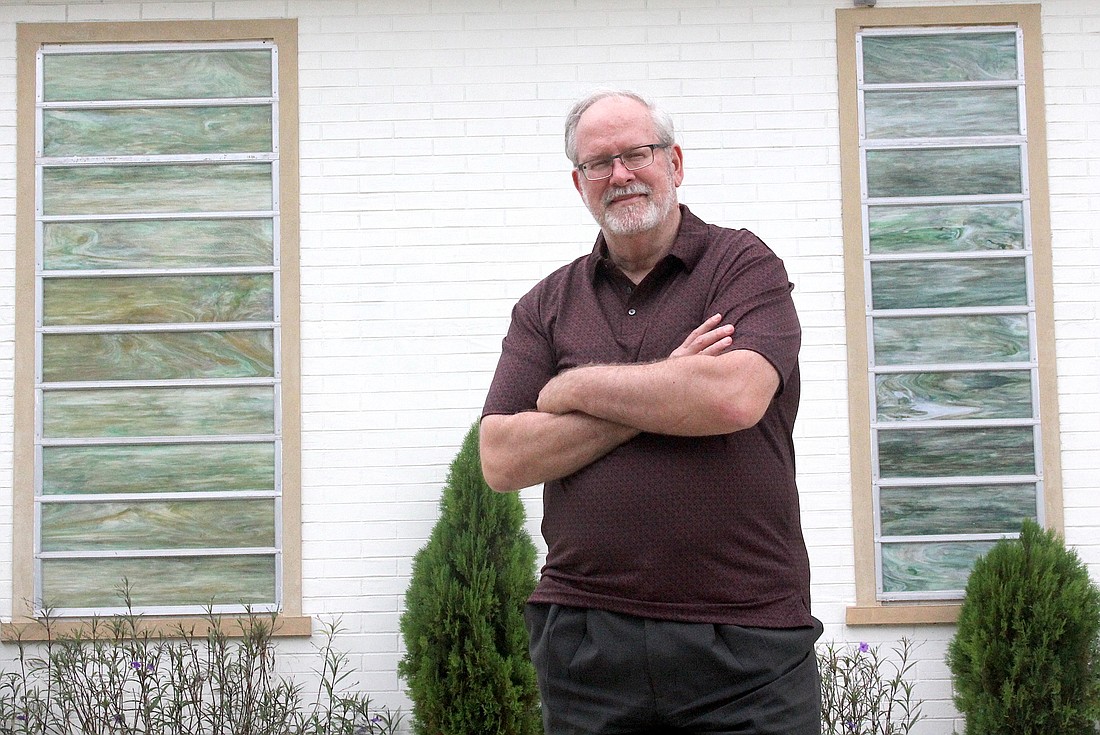- November 23, 2024
-
-
Loading

Loading

In his 48 years of theater experience, Bob Pritchard has performed in 77 plays, directed 15 and produced 12. Never has he seen a set as dynamic as the one that was built by Les Ober for the Flagler Playhouse’s upcoming performance of Neil Simon’s farce, “Rumors,” which Pritchard is directing.
In a recent interview with the Palm Coast Observer, Pritchard said his one regret is that there isn’t a curtain in front of the Playhouse stage; he would love to hear the gasps from the audience when the set is unveiled.
What follows is an edited transcript of the interview, in which he discussed his process for getting a play ready for an audience — and which performance is usually the strongest.
In a 1988 New York Times interview, Neil Simon said he thought it would be cathartic to write a comedy. Does it deliver?
I’ve done six Neil Simon plays, and most are smaller casts, usually centering on two or three people. In this show, I have eight people on stage, and we're trying do two things: convey the story, and make it funny. It’s a lot easier to have two people be funny than eight.
There’s laugh lines every other line, but keeping the story comprehensible is a challenge. I have a really good cast, and they’ve made it a lot easier. It’s very funny.
What is your process in getting a show ready for the stage?
First thing when you get the script is you read it and start taking notes about the characters. In this play, all the characters have to have some kind of comic timing. It makes my job easier if I don’t have to spoonfeed a bit to an actor.
"Once of the best descriptions of a play is you're walking by a house, and peering through the window, and listening and watching what is going on. That’s how the audeince should feel when they go to a play: peeking into someone’s private life. Our job is to make it look as real and natural as possible."
BOB PRITCHARD
When I was sent out the audition notices and people were calling and asking questions, my only response was, “Are you funny? If you’re funny, come be in my show.”
Second thing is, you already have a vision in your head of the characters, and you hope they walk in the door. About eight of 10 matched almost exactly what I had in mind.
The trick with amateur productions — and I use that term affectionately — is you have to respect their time. It’s all at night, and some people have to drive from Jacksonville, so you rehearse on their schedule.
People are volunteering their time to do this. I don’t want anyone to lose their job or have a fight with a spouse. It’s supposed to be fun.
When you do a production, you have to run the entire show, on a regular basis, for 5-8 nights in a row so that the actors get used to performing the play from beginning to end.
The lines they say are initially trying to take the word they memorize and get it out of their mouth in the correct order for the other actors. But when you start rehearsing it, all of a sudden that becomes secondary, and you can start listening to what the other person is saying, and it sounds like you’re talking, not reading lines from a play.
The more that becomes natural, the better the play is, because the people sitting in the audience are now watching a slice of life.
What’s your most important job as director?
My job as a director is to clean up the weak links, so we don’t ruin the illusion of it all.
Once the lights come up, it’s our job to captivate you. I have my hand in every aspect of it: the paint, the colors, the movement, the timing, the sound effects.
It’s not that I know more than everybody. I’ll take advice form anybody. But at the end of the day, the play has to be one person’s vision.
How does the two-story set impact the experience of this play?
The impact is monstrous. Coming out of COVID, the banks are dry, so I came up with a simple set. But Les Ober got excited about doing this set. When we met for the first time, I showed him a picture, and he’s like, “That’s nice, Bob, but how about this?” And he showed me a model he had created.
We put out the word for builders, and we had a half dozen guys and girls spend six long days to build it.
How does a play change from one weekend to another? What’s the best day to be in the audience?
As an actor, on opening night, I usually give my best performance because it’s the goal date. We’ve been working for two months for this day, so I’m ready.
As a director, I pass on the same philosophy.
The second weekend, the production is usually better because the opening weekend eliminates any nerves, any insecurities. They’ve heard the laughs, they know it works, they’re comfortable and confident.